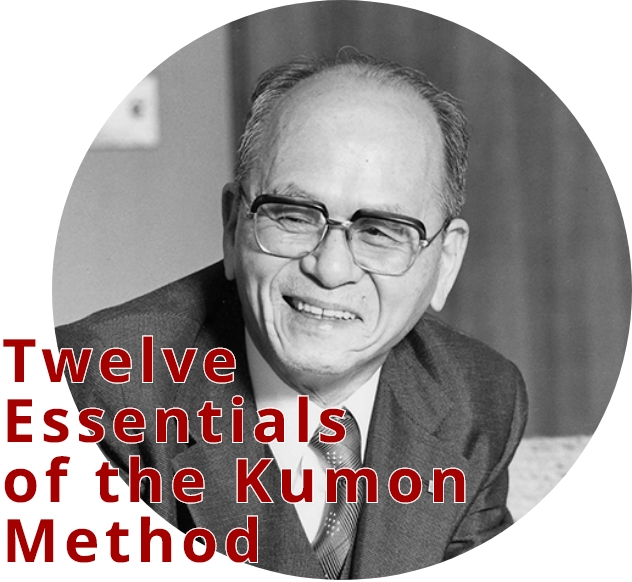Part 7 Developing Good Study Habits

There is a proverb which states, "You can lead a horse to water, but you cannot make him drink." With the Kumon materials, however, once children are led to their desks, they start to enjoy studying. There are some education specialists who say that children should be forced to overcome the hardships they face in their studies, as the word "study" in Japanese uses a kanji (Chinese character) that can mean "force to do." In my opinion, this is ridiculous. With my materials, students enjoy studying and they do not need to be coerced into studying in order to develop academic ability.
Toru Kumon
In Part 6 of this series we discussed how the Kumon Method of learning is based on providing each child
with content at the "just-right" level for him or her to study. In many cases, when educators are very
conscious of children's age or grade level it can result in assigning children work that is beyond their
ability, and as a result even lead to forcing them to do the work. In contrast, some educators give
children work that is far too easy for them over a prolonged period. However, even if the children enjoy
doing the work at first, in many cases this will lead to them getting bored, losing their motivation, and
discontinuing study.
In terms of which is better for our children's future, whether we should instill good study habits or
develop their academic ability, at Kumon we believe it is more important to instill good study habits
first. To instill good study habits in children we should avoid trying to force them to study, but rather
aim to simply have them sit at a desk each day, even for a short time, and do something that they enjoy
doing. Then as children improve their concentration, we should gradually increase the amount of work we
give them while ascertaining the "just-right" level for each child's ability. At Kumon we begin from very
easy content and let students gain practice in concentrating for short periods of time while gradually
increasing the length of time that they study for, and at the same time increasing the level that is
"just-right" for them. This is a strong point of the Kumon Method that ensures that children continue
their studies with motivation while also developing good study habits.
At Kumon we place importance on developing good study habits while also skilfully maintaining students'
motivation to learn. We emphasize not overexerting students, and studying efficiently and consistently.
Below we explain how this is done with the Kumon Method.
Continuing without overexertion
If we suddenly start to give children a lot of work to do just because they have shown a little enthusiasm
toward their study this can quickly demotivate them. For children, the right amount of study material is
just enough to leave them wanting to do a little more.
Continuing with efficiency
The Kumon program is structured in such a way that students have a clear idea of just how far they have
advanced, and it is easy to set up upcoming goals and the study projection to reach them. For this reason,
the more students do, the further they can progress on their own accord; so children enjoy studying with
this method.
Continuing with consistency
If a child does a lot of worksheets with concentration on one day but then does none at all another day,
this is not only inefficient but study will not continue for long in this manner. We need to guide
children in their studies by making a plan that will enable them to study for even 20 minutes consistently
each day, and make sure to praise them greatly for their efforts at the same time.
While we say "perseverance pays off," it is cruel to give a child something that they struggle to continue
with and order them to keep going. By continuously ascertaining the "just-right" level for a child and
gradually increasing that level, the child will develop good study habits while maintaining motivation to
learn. As a result, his or her academic ability will improve.
